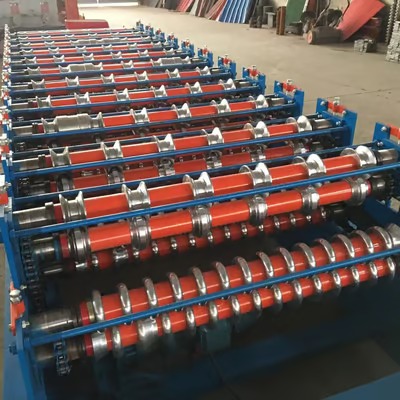Double Layer Roll Forming Machine: A Complete Guide
Double layer roll forming machines are versatile and efficient tools used in various industries for manufacturing high-quality double-layered metal sheets and panels. These machines are designed to provide precise and consistent results, making them essential for businesses involved in construction, automotive, and other related sectors. In this article, we will explore the key features, benefits, applications, and maintenance considerations of double layer roll forming machines.
1. Understanding Double Layer Roll Forming Machines
Double layer roll forming machines are specialized equipment used to shape metal sheets into desired profiles with two different layers. The machine operates by passing the metal sheet through a series of rollers that gradually bend and shape it into the desired form. These machines typically consist of a decoiler, feeder, roll forming unit, cutting system, control system, and runout tables.
2. Key Features and Benefits
Double layer roll forming machines offer several key features and benefits that make them highly sought after in the industry:
- Flexibility: These machines can produce two different profiles or layers simultaneously, providing versatility in manufacturing various products.
- High Efficiency: Double layer roll forming machines can produce large quantities of double-layered sheets or panels in a short amount of time, improving overall productivity.
- Accuracy: The precise control system of these machines ensures consistent and accurate production, reducing material waste.
- Customization: Double layer roll forming machines can be customized to meet specific requirements, allowing businesses to produce unique and tailored products.
- Cost-effective: By automating the production process and minimizing material waste, these machines help businesses save on labor and material costs.
3. Applications of Double Layer Roll Forming Machines
Double layer roll forming machines find extensive use in various industries due to their versatility and efficiency. Some common applications include:
- Construction Industry: These machines are used to manufacture roofing sheets, wall panels, cladding, and other building components.
- Automotive Industry: Double layer roll forming machines are utilized in producing car body panels, door frames, and other automotive parts.
- Appliance Industry: These machines are used in manufacturing household appliances such as refrigerators, air conditioners, and washing machine bodies.
- Furniture Industry: Double layer roll forming machines are employed in making furniture components, such as metal frames and decorative trim.
4. Maintenance Considerations
Proper maintenance is crucial to ensure the longevity and optimal performance of double layer roll forming machines. Here are some essential maintenance considerations:
- Regular Lubrication: Lubricating the machine's moving parts helps reduce friction and prevent wear and tear.
- Inspection and Cleaning: Regularly inspecting and cleaning the machine's components helps identify any potential issues and ensures smooth operation.
- Replacing Worn Parts: Timely replacement of worn-out or damaged parts is necessary to avoid any disruptions in the production process.
- Training and Operator Knowledge: Providing training to machine operators on proper operation and maintenance practices is vital for maximizing machine efficiency and minimizing downtime.
5. Conclusion
Double layer roll forming machines are essential equipment for businesses involved in sheet metal manufacturing. With their ability to produce high-quality double-layered sheets and panels with precision and efficiency, these machines offer significant advantages in terms of productivity, cost-effectiveness, and customization. By understanding the key features, benefits, applications, and maintenance considerations of double layer roll forming machines, businesses can make informed decisions and leverage their capabilities to stay competitive in the market.

